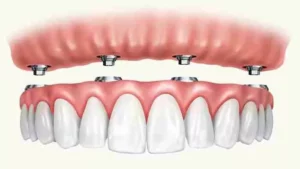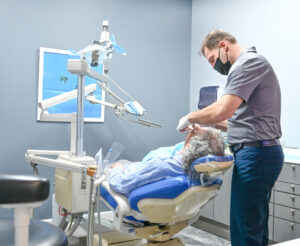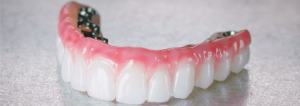Imagine regaining your complete smile and being able to enjoy your favorite foods without worry. The All-on-4 dental implant procedure, also known as all 4 dental implants, can make this a reality, offering a permanent, natural-looking solution for those with missing teeth. In this guide, we’ll dive into the world of All-on-4 dental implants, exploring their advantages, ideal candidates, and the step-by-step procedure. Learn how this innovative treatment compares to traditional dental implants, dentures, and other options, as well as how to finance and maintain your new smile.
Key Takeaways
- All-on-4 dental implants provide a full arch of replacement teeth supported by four implants and offer improved healing times, stability, and cost-effectiveness compared to other tooth replacement options.
- Ideal candidates for All-on 4 include those with missing teeth, denture wearers, or low bone density. Consulting a professional is necessary to determine suitability.
- The procedure involves an initial consultation through implant surgery culminating in the placement of permanent prosthesis for a strong long lasting solution with daily oral hygiene routines & regular checkups essential for maintenance.
Understanding All-on-4 Dental Implants
 All-on-4 dental implants are a revolutionary treatment concept in restorative dentistry, providing a full arch of natural-looking replacement teeth supported by only four implants. The procedure involves:
All-on-4 dental implants are a revolutionary treatment concept in restorative dentistry, providing a full arch of natural-looking replacement teeth supported by only four implants. The procedure involves:
- Placing two axial implants in the front
- Placing two tilted posterior implants in the posterior region of the jaw
- Maximizing the use of available bone
- Eliminating the need for bone grafts in many cases
This innovative approach has transformed the lives of countless patients, offering a reliable and efficient alternative to traditional implants and removable dentures.
The advantages of All-on-4 go beyond its streamlined design. Studies have shown that this treatment offers faster healing times, improved stability, and cost-effectiveness compared to other tooth replacement options.
So, who is an ideal candidate for All-on-4 dental implants, and what does the procedure entail? Let’s explore further.
The Advantages of All-on-4
One of the most significant benefits of All-on-4 dental implants is their ability to support an entire row of teeth with just four implants. This not only speeds up the treatment process but also greatly reduces the overall cost when compared to traditional implants that may require six to eight implants per arch. The unique placement of axial and tilted implants, also known as angled implants, allows for enhanced stability and an immediate-function solution, meaning patients can enjoy their new teeth shortly after surgery.
In addition to being cost-effective and efficient, All-on-4 dental implants provide the following benefits:
- More natural teeth appearance
- Restoration of facial structure by stimulating the jawbone during the dental implant procedure
- Restoration of lost mass in the jawbone, resulting in a healthier, more youthful appearance
- Improved oral health that cannot be achieved with removable dentures
Ideal Candidates for All-on-4
All-on-4 dental implants are an excellent solution for individuals with missing teeth, denture wearers, and those with low bone density who may not be suitable candidates for traditional dental implants. The fixed full arch restoration achieved with All-on-4 is particularly beneficial for edentulous patients who are missing either all or a significant portion of their teeth.
Certain factors like a history of periodontal disease, bruxism, smoking, and type II diabetes could potentially contraindicate All-on-4 dental implants. Nonetheless, individuals who manage these health conditions well could still be eligible for the procedure.
Consulting a dental professional and reviewing pertinent research are necessary steps to ascertain if All-on-4 dental implants suit your situation.
The All-on-4 Procedure: Step by Step
The All-on-4 procedure is a comprehensive dental treatment that begins with an initial consultation and culminates with the placement of a final restoration. For a clearer understanding of the entire All-on-4 journey, we will guide you through the process from the initial consultation to the final smile restoration.
Initial Consultation and Assessment
The first step in the All-on-4 process is the initial consultation and assessment, which includes a comprehensive examination, dental health review, and treatment planning. During this appointment, your dentist will conduct a thorough review of your dental health and medical history, take x-rays and digital 3D scans, and perform a physical examination of your mouth. This information allows your dentist to identify and address any existing issues prior to the commencement of the All-on-4 procedure and ensure that all aspects of your goals are taken into account.
Careful planning guarantees a precise fit, maximum patient comfort, and increased stability between the implants and the prosthesis. Measurements are taken to determine where to place the implants and design the replacement teeth. In some cases, tooth extractions and/or bone grafting surgeries, including a bone graft, may be necessary before implant placement.
Implant Surgery
The surgical component of the All-on-4 surgical procedure involves the following steps:
- Placement of four dental implants in each arch, utilizing the All-on-4 technique.
- Fitting the implant posts with small connectors called abutments, which provide a secure attachment point for the prosthetic teeth.
- Depending on your specific needs, local anesthesia or sedation dentistry may be used during the implant surgery, ensuring your comfort throughout the procedure.
The All-on-4 dental implant procedure is a relatively quick process. It usually takes between 3 and 4 hours to finish the entire mouth. After the implants are placed, the healing process begins, during which the implants fuse with the jawbone in a process called osseointegration. This secure bond between the implant and bone provides the foundation for your new teeth, making dental implant surgery a reliable solution.
Temporary Restoration
While the implants heal and become integrated with the bone, temporary dentures or bridges are placed to provide you with a functional and aesthetic solution during the healing process. These temporary restorations, typically made of acrylic and composite materials, allow you to chew and perform other daily functions with ease. Patients usually wear temporary restorations during the All-on-4 procedure for a period of three to six months.
Maintaining good oral hygiene during the temporary restoration phase is vital because it contributes to the long-term success of the All-on-4 dental implants. Brushing and flossing regularly, along with routine dental checkups, will keep your temporary teeth and the surrounding gum tissue healthy and clean.
Final Restoration
Once the implants have fully healed and fused with the bone, it’s time for the final restoration process. The permanent, custom-made prosthesis is attached to the dental implants via the connectors installed on the implants during the surgical placement phase. Materials used in the permanent prosthesis include acrylic, porcelain, and zirconia, offering a strong, long-lasting solution for your new smile.
The final restoration process for the All-on-4 procedure typically takes approximately four to six months. With your new teeth securely in place, you can enjoy the benefits of a complete, healthy smile and the confidence that comes with it.
Comparing All-on-4 to Other Treatment Options
Despite the numerous advantages of All-on-4 dental implants, understanding their comparison with other tooth replacement alternatives like:
- Traditional dental implants
- Dentures
- Overdentures
- Fixed bridges
is crucial. Each treatment option has its pros and cons, and selecting the best solution for your needs depends on factors such as your oral health, budget, and personal preferences.
We will examine each alternative in more detail.
Traditional Dental Implants
Traditional dental implants are:
- Titanium screws that are surgically placed in the jawbone
- Attached to a restoration, serving as a replacement for the roots of missing teeth
- Provide a secure foundation for artificial teeth
- Known for their natural-looking and functioning tooth replacement, permanency, and improved chewing, speech, and appearance.
However, traditional dental implants have some drawbacks compared to All-on-4, such as:
- The expense of the procedure
- The length of the treatment
- Certain requirements that must be met
- The possibility of requiring more implants per arch, which can increase the overall cost and healing time.
Dentures
Dentures are removable prosthetic teeth used to replace missing teeth, and they come in various styles, including full and partial dentures. While dentures can provide a quick and relatively inexpensive solution for tooth loss, they have some disadvantages when compared to fixed teeth solutions like All-on-4 dental implants, especially for those with some remaining teeth.
Some disadvantages of dentures include:
- They can be uncomfortable
- They may alter speech
- They require more meticulous maintenance
- They are prone to slipping or dislodging during eating or speaking
All-on-4 dental implants, on the other hand, are permanently affixed to the jawbone, providing a more comfortable, stable, and natural-looking tooth replacement option. All-on-4 implants also have the added benefit of preserving jawbone health and preventing facial structure deterioration, which can occur with long-term denture use.
Overdentures and Fixed Bridges
Overdentures are a type of denture that attaches to dental implants via snapping mechanisms, providing increased comfort, reduced bulkiness in the mouth, and greater stability when compared to traditional dentures. Fixed bridges, on the other hand, are dental restorations that replace one or more missing teeth by anchoring to adjacent natural teeth or dental implants. Both overdentures and fixed bridges can offer functional and aesthetic benefits, but they may not provide the same level of stability, comfort, and jawbone preservation as All-on-4 dental implants.
Ultimately, the choice between All-on-4 dental implants, traditional dental implants, dentures, overdentures, and fixed bridges depends on your unique needs and preferences. By understanding the advantages and disadvantages of each option, you can make an informed decision about the best tooth replacement solution for you.
Financing and Insurance for All-on-4 Dental Implants
Although the cost of All-on-4 dental implants can seem intimidating, financing options and potential insurance coverage can make this transformative treatment more affordable. We will delve into the cost breakdown, financing alternatives, and insurance coverage for All-on-4 dental implants, which will help you make an informed decision about investing in a new smile.
Cost Breakdown
The cost of All-on-4 dental implants varies depending on factors such as the package selected, the materials used, and the geographic location of your dental provider. On average, the cost of All-on-4 dental implants in the United States ranges from $20,000 to $40,000 per arch. This cost typically includes the surgical implant placement, custom-made prosthesis, and any necessary pre-treatment procedures, such as tooth extractions or bone grafting.
While the upfront cost may be higher than alternative tooth replacement options, it’s essential to consider the long-term value of All-on-4 dental implants. With proper care and maintenance, these implants can last a lifetime, providing a stable, comfortable, and natural-looking solution for missing teeth that can improve your overall health and quality of life.
Financing Options
Several financing possibilities exist to make All-on-4 dental implants more affordable. One popular option is CareCredit®, a third-party financing company that provides special payment plans for dental procedures, including All-on-4 dental implants. CareCredit® offers patients the flexibility to pay for their treatment over time with low monthly payments or no-interest financing, depending on their qualifications.
Other financing options include payment plans through dental clinics and dental loans, which are offered by some dental providers or third-party companies. Examining the terms, interest rates, and repayment schemes of each financing option is crucial to decide what best fits your needs and financial standing.
Insurance Coverage
Many dental insurance plans do not cover All-on-4 dental implants, as they often classify them as a cosmetic procedure. However, some insurance plans may cover a portion of the cost, such as preparatory procedures, diagnostic testing, or extractions. Reviewing your insurance plan’s specifics is necessary to identify which parts of the All-on-4 procedure may be covered.
Additionally, some insurance companies that provide coverage for All-on-4 procedures include:
- Aflac
- Humana
- Delta Dental
- Spirit Dental
Be sure to consult with your insurance provider and dental professional to maximize your benefits and minimize your out-of-pocket expenses for your patient’s dental health.
Caring for Your All-on-4 Dental Implants
After investing in your new smile, it’s imperative to care for your All-on-4 dental implants properly to guarantee their health and long life. By following daily oral hygiene practices and scheduling regular dental checkups and professional maintenance, you can keep your implants clean, healthy, and functioning optimally for many years to come.
Daily Oral Hygiene
Good oral hygiene is vital for the All-on-4 dental implants’ long-term success. Brushing your implants at least twice daily with a soft-bristled toothbrush or an electric toothbrush will help keep them clean and free from plaque buildup. Flossing around each implant is also crucial for removing food debris and preventing gum disease.
In addition to regular brushing and flossing, it’s important to use a minimally abrasive toothpaste, non-alcoholic mouthwash and a waterpik to avoid damaging your implants and the surrounding gum tissue. Following these daily oral hygiene practices will help ensure that your All-on-4 dental implants remain healthy and functional for a lifetime.
Professional Checkups and Maintenance
Consistent dental checkups and professional upkeep are crucial for the sustained health and success of your All-on-4 dental implants. It is recommended that patients with All-on-4 dental implants schedule regular checkups with their dentist every six months, or twice a year. These visits will allow your dentist to closely monitor the condition of your implants and address any potential issues promptly.
During your checkups, your dentist will perform a thorough examination of your implants, gums, and surrounding tissues, as well as provide professional cleanings to remove any plaque or tartar buildup. By keeping up with regular dental visits, you can ensure the longevity and optimal performance of your All-on-4 dental implants.
Addressing Potential Issues
In the unusual occurrence of All-on-4 dental implant failure or complications, recognizing the signs and seeking immediate treatment is vital. Indications of implant failure may include:
- Severe pain and discomfort
- Gum recession around the implant
- Difficulty chewing and biting
- Shifting or loose implant
- Inflammation or swelling
- Gum inflammation
If you experience any of these symptoms, consult with your dentist as soon as possible. They will diagnose the issue and recommend appropriate treatment options, such as:
- antibiotics
- dental cleaning
- surgery
- implant removal
By addressing potential issues early, you can protect your investment in your new smile and maintain the health and function of your All-on-4 dental implants.
Summary
All-on-4 dental implants offer a life-changing solution for those seeking a complete, natural-looking smile. With numerous advantages over traditional dental implants, dentures, and other tooth replacement options, All-on-4 provides a cost-effective, efficient, and comfortable alternative. By understanding the procedure, comparing treatment options, and exploring financing and insurance possibilities, you can make an informed decision about your tooth replacement journey. With proper care and maintenance, your All-on-4 dental implants can last a lifetime, allowing you to enjoy the confidence and improved quality of life that comes with a healthy, beautiful smile.
Frequently Asked Questions
What is the downside of All-on-4 dental implants?
All-on-4 dental implants may be associated with a risk of failed implant and difficulty in speech, and they can also be quite expensive, making them unaffordable for some patients.
How much does All-on-4 cost in Tennessee?
On average, All-on-4 cost in Maryland ranges from $15,000 to $30,000 per arch.
How many teeth do you get with 4 implants?
With 4 dental implants, you can replace up to 14 teeth. The procedure places four implants in areas of higher bone density, and they are each topped with a two-unit restoration – a crown and pontic (artificial tooth).
What is the typical cost of All-on-4 dental implants?
The typical cost of All-on-4 dental implants in the United States is between $20,000 and $40,000 per arch.
How many implants are used in the All-on-4 procedure?
The All-on-4 procedure requires four dental implants per arch, meaning a total of eight implants for the full procedure.







